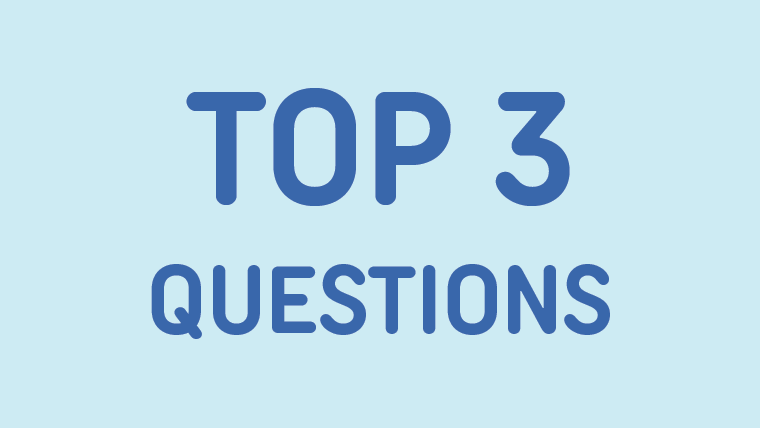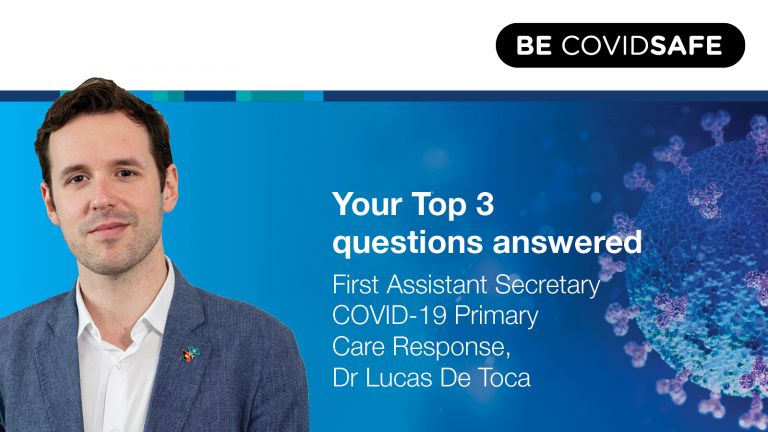
Good morning. I am Lucas de Toca and I lead the Department of Health's COVID-19 primary-care response. Welcome to top three. I'm joined today by Linda who will be doing Auslan interpreting. We're in the land of the Ngunawal people. Dhawra nhuna, dhawra Ngunawal. Yanggu gulanyin ngalawiri, dhunayi, Ngunawal dhawra. Wanggarralijinyin mariny balan bugarabang. My shout out today goes to the people in Melbourne. Thank you so much for following the very important public health measures that are helping keeping you and all of us safe from COVID-19. Thank you very much for all you're doing and our thoughts and our warmth goes to you during the extended lockdown.
First question, why do people who have received their COVID-19 vaccines have to be in lockdown?
Yeah so that's a very topical question, especially acknowledging what's happening in Victoria at the moment. So we've discussed before that we know very well, and there's mounting and mounting evidence, that the COVID-19 vaccines that are approved in Australia, the AstraZeneca Oxford vaccine and the Pfizer BioNTech vaccine, are incredibly effective at preventing serious disease, hospitalisation and even death from COVID-19. That's really important and it grants us the direct protection that we need to make sure that us and others around us are protected from this very serious disease. However, there's still growing evidence and there's still a growing process to fully understand what the impact of these vaccines is in transmission. We know that people who have received the vaccine can still has or still has a chance of contracting the virus. They're protected from a severe outcome from contracting that virus but they're not completely shielded from being infected at all. And so it is really important, even if you're vaccinated, that you still maintain adherence to the public health measures: practice physical distancing, stay at home if required in your area, practice hand hygiene often and all the different things that we have done over the last 15 months, now 16 months, to keep us all safe. If you have cold and flu symptoms, even if they're very mild, even if you're vaccinated, please still isolate at home and go and get a Covid test. There's growing evidence that these vaccines do have an impact in transmission that we're about to talk about, however they don't prevent contracting the virus completely. They will keep you safe but it's still important that you adhere to those public health measures.
Second question, can I transmit the COVID-19 virus to someone after being vaccinated?
Yeah so that's what we were talking about just before. It's becoming more and more apparent that these vaccines have a real life impact in reducing the chance of transmission from the virus. There's a really large study in the UK undertaken by Public Health England that looks at transmission in 365,000 households with a mix of vaccinated and unvaccinated members. What that study showed, was that for people vaccinated who tested positive for the virus, that is, there was detection of presence of the virus in them, there was a 40 to 50 percent reduction in the chance of their infection being transmitted to other household family members. And so that is a very significant impact, especially acknowledging that household transmission and transmission between members of the same house is a very common way of transmitting COVID-19, both domestically and overseas. So really promising results that show that vaccines will most likely make a very significant impact on the ongoing change and transmission of the virus. And we have seen that not just with that study but also with other surveillance data and general case data from countries that are going through outbreaks at the moment, and the cases are changing based on their vaccination rates and so all very promising and all very encouraging but still we are going for direct protection. We want to make sure that everyone in Australia who is eligible to receive a vaccine has the opportunity to get it because that is the best way to make sure that they're directly protected from severe disease, hospitalisation and death from the virus.
And finally, are new COVID-19 strains likely to impact the effectiveness of the vaccines?
Yeah so all viruses evolve, like essentially anything that replicates, anything that reproduces, can change and mutate while they're doing so. Humans do it as well and that's how evolution works. Because viruses are very small, changes can have significant impact but also because they replicate so quickly, cycles of replication have happened very rapidly, mutations tend to be common in those, in viruses. SARS-CoV-2, the virus that causes COVID-19, is no exception and like any other virus it mutates. Change mutation, like the word, mutation is a bit scary but it just means change, that's what it is, but mutations are often irrelevant, like they don't change anything, and more often than not are actually what we call deleterious, they're bad for the virus, so they're screened out as part of their viral evolution. Sometimes mutations can give the virus an advantage. Some resistance to a treatment or some immune escape that can evade defences and those mutations are often kept and that's why new strains emerge. Mutation is chance, so the more chances a virus has to replicate, the more, the higher the likelihood for a mutation to emerge and for a new variant strain to emerge, and that's why it's so important that vaccination happens at a global scale because it reduces the amount of virus circulating, which then reduces the chances of the virus mutating. The COVID-19 vaccines and the immune response that we mount against the COVID-19 virus when we when we get vaccinated, triggers a whole range of aspects of the immune system, generates a different number of antibodies, the little molecules, the little proteins that attach to the virus and help your immune system neutralise it and fight it, but also other aspects of the immune response like the T cells, which are other type of white blood cells. That means that even for variant strains, and we are seeing that in real evidence, in real life evidence around the world, the vaccines remain effective. There might be changes on the effectiveness for certain strains and for certain vaccines and we are still learning from what's happening around the world and what impacts that has in the effectiveness of the vaccine programs, but overall what we are seeing is for the vaccines that we are using, for the immense majority of variant strains, are around the countries that are suffering outbreaks from those strains, is that the vaccines are retaining their effectiveness in preventing severe disease, hospitalisation and death. That, it sounds very repeat repetitive throughout this segment, but is ultimately what we are going for with this vaccination program. So that's the end of the questions we have for today. Remember anyone 50 years and over, and 40 years and over in Victoria, is currently eligible to receive a COVID-19 vaccine. Younger people, if they're part of the at-risk groups or occupations that make you eligible under phase one, are also able to receive a COVID-19 vaccine. Vaccines are absolutely voluntary but we strongly encourage you to please get one if it's offered to you because they're really important, they're probably the most important way in which we can fight this pandemic and move on from this horrible virus. Thank you very much. Thank you Linda. Thanks for watching and thank you for staying CovidSafe. We're with you Victoria.
Top 3 questions
- Why do people who have received their COVID-19 vaccines have to be in lockdown?
- Can I transmit the COVID-19 virus to someone after being vaccinated?
- Are new COVID-19 strains likely to impact the effectiveness of the vaccines?







